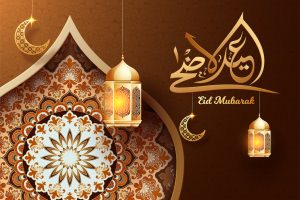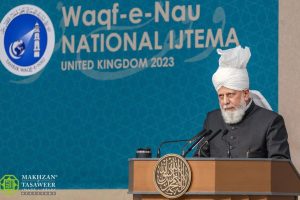
Sulaiman Manuel Serritos, Mexico
I converted to Islam about four years ago. When I heard about the festival of Eid, I found it very interesting. I was attracted to the idea of sharing what you have with other people, which is what is done with the meat of the animal that is sacrificed during this festival.
This is fascinating because it shows us one of the facets of Islam, which is to share the benefits and blessings that Allah Almighty has given us with people who are less fortunate, with the brothers of the community, with friends and relatives and with our own immediate family.
For certain reasons, for the first two years after my conversion we were not able to sacrifice an animal, however, in the third year after my conversion, I had the opportunity to do it. One of the brothers in the community and I decided to do it between the two of us. We did not know exactly how to do it and our Imam at that time was not in Mexico because he had to travel, but fortunately, he gave us some instructions.
Together with brother Ruben, we looked for a good sheep of a suitable size and age and finally, the day arrived. The sacrifice was made at Don Ruben’s house, and we were accompanied by brother Jesus. For me it was the first time in my life that I would sacrifice an animal, I had never done it before. However, because Don Ruben already had some experience in these matters he was appointed to perform the sacrifice.
We said our prayer, and sacrificed it in a swift manner according to the teachings of Islam, in order to ensure that the animal endures the least amount of pain. We were not exactly professional butchers, but after a few hours, we managed to remove the skin and cut the lamb into large pieces. We divided the meat between us so that each of us could share it with our friends, family, neighbours, and people in need.
I was worried because the pieces of meat were very large. My half of the meat was in three or four large cuts. Fortunately, on the way back I discovered a butcher shop, and I asked the manager to cut the meat into small pieces for family consumption. He spread the meat on his table, grabbed an axe and in a few minutes, he gave me all the meat completely divided so that I could bag it and distribute it. That made me incredibly happy because I had solved a problem that at the time was a very big one for me.
And so it was that I shared that lamb with some fellow Ahmadis in my community, with neighbours who I considered in need and for whom the gift of a kilogram of meat was very precious. I also sent some to my relatives who live nearby and with my immediate family.
After a few days, the people to who I gave the meat began to tell me about how they had cooked it; either barbecued or roasted. But they all agreed that it was very rare that a person had approached them and said, ‘I have come to give you a kilo of meat.’ This is something that is very rare in our culture. Nevertheless, this also provided me with the opportunity to explain that this is an Islamic custom and that my religion asks me to do this.
There were some friends who were Christians who told me that in the present time, there is no need for animal sacrifices to God. They said that that this was the custom in the Old Testament, and that we Muslims were living under the Law of Moses and they Christians are living under the grace of their saviour Christ.
My explanation to them was that yes indeed, Eid-ul-Adha is a day where we remember the obedience and the sacrifice that the Prophet Abraham (as) was going to make of his son Ishmael (as), but that this feast has a social aspect to it that consists in sharing the meat with people in need, with friends and with family. Sharing something with another person in the way of Allah is a blessing for us. I hope they understood this big difference.
This year we plan to do the same. We already went to a ranch to see sheep and have selected the ones we would like to sacrifice. The Imam is with us, and I hope Insha’Allah [God-willing] that this festival of Eid-ul-Adha will be much bigger, more participatory, and leave a deeper impact in the hearts and minds of all the Muslim brothers of the Ahmadiyya Community.



Add Comment